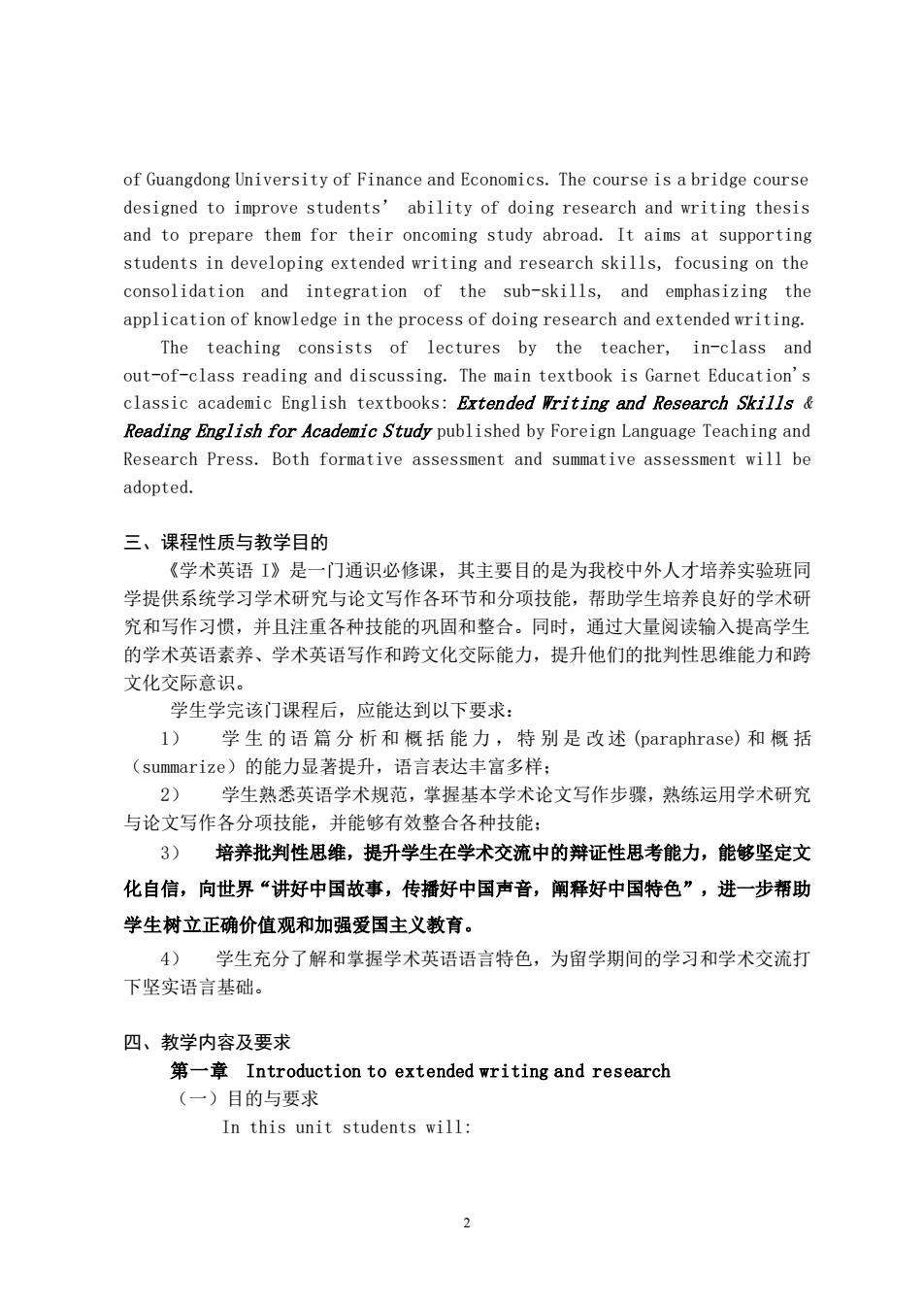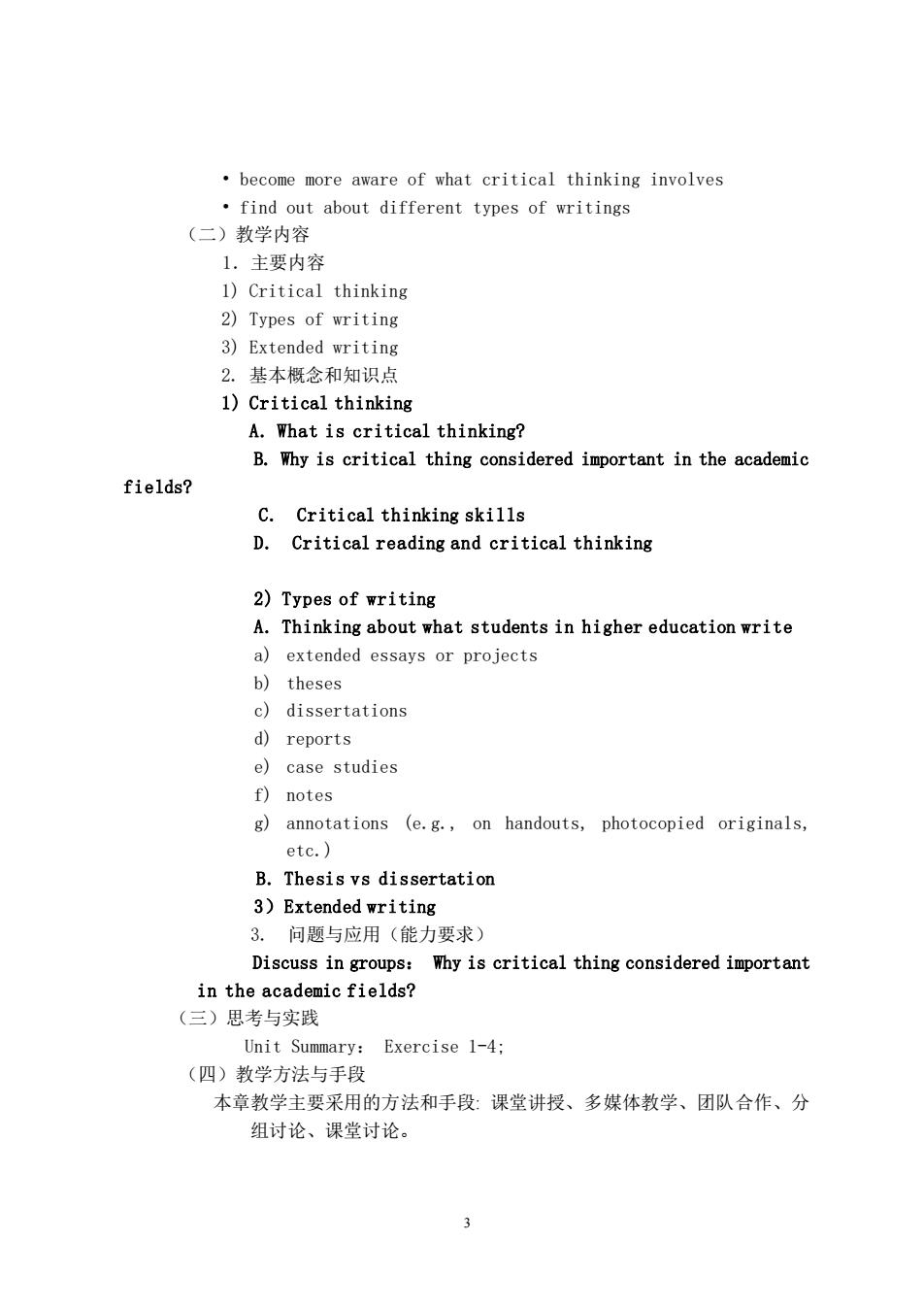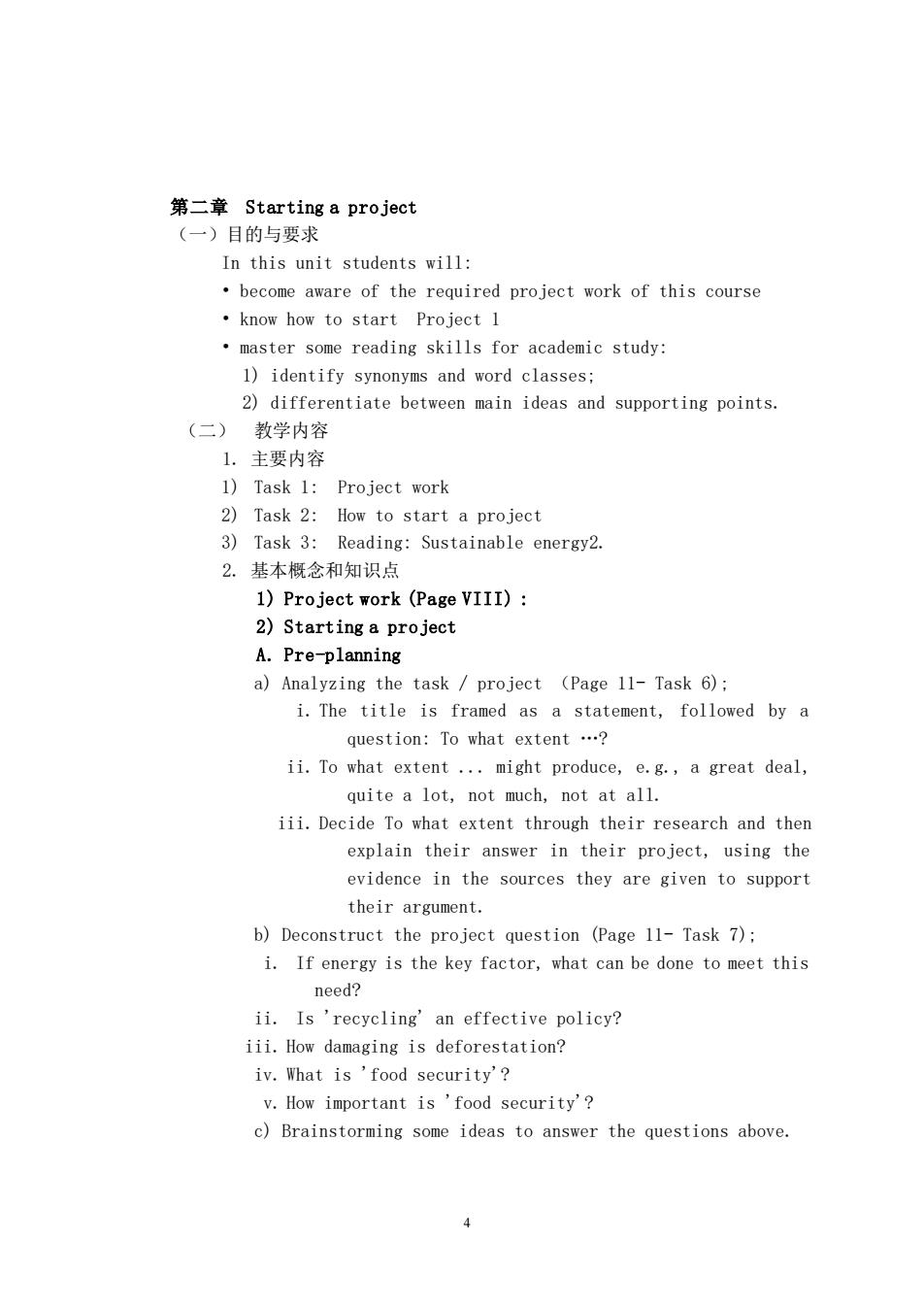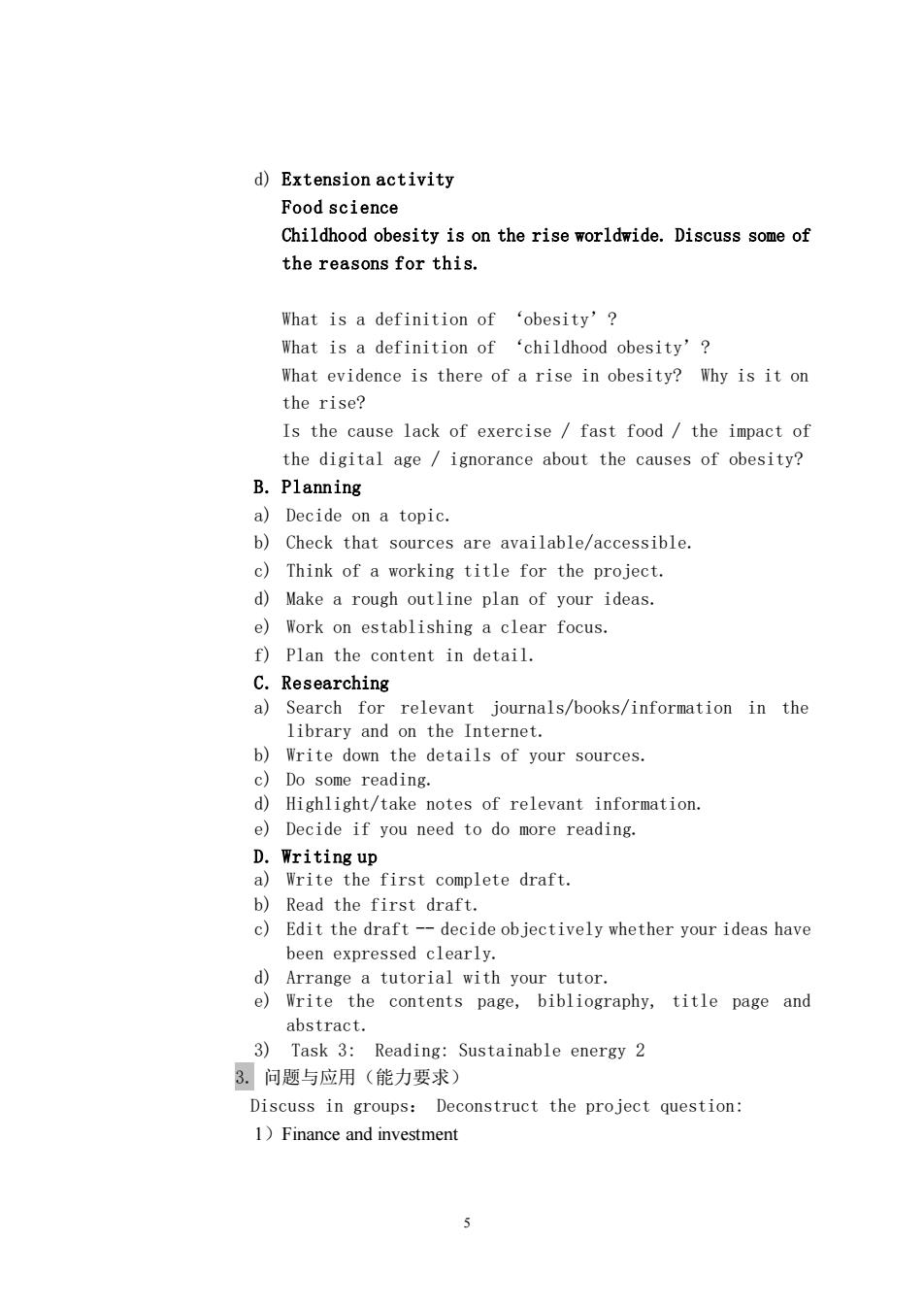
《学术英语1》课程教学大纲 一、课程基本信息 课程代码:16133102 课程名称:学术英语I 英文名称:Academic English 课程类别:通识课 时:32 学 分:2 适用对象:金融学中外联合培养项目班级 考核方式:考试 先修课程:商务英语阅读山,商务英语写作” 二、课程简介 《学术英语》专门针对广东财经大学中外人才培养实验班二年级学生开设 的大学英语系列改革课程之一。该课程是一门桥梁课程,旨在提高中国学生的学术研 究与论文写作能力,帮助他们为接下来的留学学习做好准备。该课程以学术研究与论 文写作各环节和分项技能的训练为纲,帮助学生培养良好的学术研究和写作习惯,并 且注重技能的巩固和整合,强调学以致用。同时,课程注重中西结合,在学术阅读和 写作中加强爱国主义教育,增加学生文化自信,培养学生批判性思维,使之既要继承 中华优秀传统文化又要弘扬时代精神,既要立足本国又要面向世界,即把中华传统文 化以及现代文化的创新成果继承下来,传播出去,发扬光大,最终促使他们成为向世 界介绍中国、传播中华文化且具有国际视野的高端双语复合型人才。 该课程教学采取以学生为中心,教师讲授为引导,学生阅读训练以及主题讨论为 辅助的模式:将面授与机助学习,课内讲授和课后自主学习紧密结合起来。课堂教学 采用外语教学与研究出版社引自的Garnet Education的经典学术英语教材《学术研 究与论文写作》和《学术英语阅读》。本课程的教学评估包括形成性评估和终结性评 估 Academic English I is one of the series of College English reform courses for students of grade two in Sino-foreign talent training experimental classes
1 《学术英语 I》课程教学大纲 一、课程基本信息 课程代码:16133102 课程名称:学术英语 I 英文名称:Academic English I 课程类别:通识课 学 时:32 学 分:2 适用对象: 金融学中外联合培养项目班级 考核方式:考试 先修课程:商务英语阅读 II,商务英语写作 II 二、课程简介 《学术英语 I》专门针对广东财经大学中外人才培养实验班二年级学生开设 的大学英语系列改革课程之一。该课程是一门桥梁课程,旨在提高中国学生的学术研 究与论文写作能力,帮助他们为接下来的留学学习做好准备。该课程以学术研究与论 文写作各环节和分项技能的训练为纲,帮助学生培养良好的学术研究和写作习惯,并 且注重技能的巩固和整合,强调学以致用。同时,课程注重中西结合,在学术阅读和 写作中加强爱国主义教育,增加学生文化自信,培养学生批判性思维,使之既要继承 中华优秀传统文化又要弘扬时代精神,既要立足本国又要面向世界,即把中华传统文 化以及现代文化的创新成果继承下来,传播出去,发扬光大,最终促使他们成为向世 界介绍中国、传播中华文化且具有国际视野的高端双语复合型人才。 该课程教学采取以学生为中心, 教师讲授为引导,学生阅读训练以及主题讨论为 辅助的模式;将面授与机助学习,课内讲授和课后自主学习紧密结合起来。课堂教学 采用外语教学与研究出版社引自的 Garnet Education 的经典学术英语教材《学术研 究与论文写作》和《学术英语阅读》。本课程的教学评估包括形成性评估和终结性评 估。 Academic English I is one of the series of College English reform courses for students of grade two in Sino-foreign talent training experimental classes

of Guangdong University of finance and Economics.The course is a bridge course designed to improve students'ability of doing research and writing thesis and to prepare them for their oncoming study abroad.It aims at supporting students in developing extended writing and research skills,focusing on the consolidation and integration of the sub-skills,and emphasizing the application of knowledge in the process of doing research and extended writing. The teaching consists of lectures by the teacher,in-class and out-of-class reading and discussing.The main textbook is Garnet Education's classic academic English textbooks:Extended Writing and Research Skills Reading English for Academic Study published by Foreign Language Teaching and Research Press.Both formative assessment and summative assessment will be adopted. 三、课程性质与教学目的 《学术英语I》是一门通识必修课,其主要目的是为我校中外人才培养实验班同 学提供系统学习学术研究与论文写作各环节和分项技能,帮助学生培养良好的学术研 究和写作习惯,并且注重各种技能的巩固和整合。同时,通过大量阅读输入提高学生 的学术英语素养、学术英语写作和跨文化交际能力,提升他们的批判性思维能力和跨 文化交际意识。 学生学完该门课程后,应能达到以下要求: l)学生的语篇分析和概括能力,特别是改述(paraphrase)和概括 (summarize)的能力显著提升,语言表达丰言多样: 2)学生熟悉英语学术规范,掌握基本学术论文写作步骤,熟练运用学术研究 与论文写作各分项技能,并能够有效整合各种技能: 3) 培养批判性思维,提升学生在学术交流中的辩证性思考能力,能够坚定文 化自信,向世界“讲好中国故事,传播好中国声音,阐释好中国特色”,进一步帮助 学生树立正确价值观和加强爱国主义教育 4)学生充分了解和掌握学术英语语言特色,为留学期间的学习和学术交流打 下坚实语言基础。 四、教学内容及要求 Introduction to extended writing and research (一)目的与要求 In this unit students will: 2
2 of Guangdong University of Finance and Economics. The course is a bridge course designed to improve students’ ability of doing research and writing thesis and to prepare them for their oncoming study abroad. It aims at supporting students in developing extended writing and research skills, focusing on the consolidation and integration of the sub-skills, and emphasizing the application of knowledge in the process of doing research and extended writing. The teaching consists of lectures by the teacher, in-class and out-of-class reading and discussing. The main textbook is Garnet Education's classic academic English textbooks: Extended Writing and Research Skills & Reading English for Academic Study published by Foreign Language Teaching and Research Press. Both formative assessment and summative assessment will be adopted. 三、课程性质与教学目的 《学术英语 I》是一门通识必修课,其主要目的是为我校中外人才培养实验班同 学提供系统学习学术研究与论文写作各环节和分项技能,帮助学生培养良好的学术研 究和写作习惯,并且注重各种技能的巩固和整合。同时,通过大量阅读输入提高学生 的学术英语素养、学术英语写作和跨文化交际能力,提升他们的批判性思维能力和跨 文化交际意识。 学生学完该门课程后,应能达到以下要求: 1) 学 生 的 语 篇 分 析 和 概 括 能 力 , 特 别 是 改 述 (paraphrase) 和概括 (summarize)的能力显著提升,语言表达丰富多样; 2) 学生熟悉英语学术规范,掌握基本学术论文写作步骤,熟练运用学术研究 与论文写作各分项技能,并能够有效整合各种技能; 3) 培养批判性思维,提升学生在学术交流中的辩证性思考能力,能够坚定文 化自信,向世界“讲好中国故事,传播好中国声音,阐释好中国特色”,进一步帮助 学生树立正确价值观和加强爱国主义教育。 4) 学生充分了解和掌握学术英语语言特色,为留学期间的学习和学术交流打 下坚实语言基础。 四、教学内容及要求 第一章 Introduction to extended writing and research (一)目的与要求 In this unit students will:

become more aware of what critical thinking involves find out about different types of writings (二)教学内容 1.主要内容 l)Critical thinking 2)Types of writing 3)Extended writing 2.基本概念和知识点 1)Critical thinking A.What is critical thinking? B.Why is critical thing considered important in the academic fields? C.Critical thinking skills D.Critical reading and critical thinking 2)Types of writing A.Thinking about what students in higher education write a)extended essays or projects b)theses c)dissertations d)reports e)case studies f)notes g)annotations (e.g.,on handouts,photocopied originals, etc.) B.Thesis vs dissertation 3)Extended writing 3.问题与应用(能力要求) Discuss in groups: Why is critical thing considered important in the academic fields? (三)思考与实践 Unit Summary:Exercise 1-4; (四)教学方法与手段 本章教学主要采用的方法和手段:课堂讲授、多媒体教学、团队合作、分 组讨论、课堂讨论。 3
3 • become more aware of what critical thinking involves • find out about different types of writings (二)教学内容 1.主要内容 1) Critical thinking 2) Types of writing 3) Extended writing 2. 基本概念和知识点 1) Critical thinking A. What is critical thinking? B. Why is critical thing considered important in the academic fields? C. Critical thinking skills D. Critical reading and critical thinking 2) Types of writing A. Thinking about what students in higher education write a) extended essays or projects b) theses c) dissertations d) reports e) case studies f) notes g) annotations (e.g., on handouts, photocopied originals, etc.) B. Thesis vs dissertation 3)Extended writing 3. 问题与应用(能力要求) Discuss in groups: Why is critical thing considered important in the academic fields? (三)思考与实践 Unit Summary: Exercise 1-4; (四)教学方法与手段 本章教学主要采用的方法和手段: 课堂讲授、多媒体教学、团队合作、分 组讨论、课堂讨论

第二章Starting a project (一)目的与要求 In this unit students will: become aware of the required project work of this course know how to start Project 1 master some reading skills for academic study: 1)identify synonyms and word classes; 2)differentiate between main ideas and supporting points. (二)教学内容 1.主要内容 1)Task 1:Proiect work 2)Task 2:How to start a project 3)Task 3:Reading:Sustainable energy2. 2.基本概念和知识点 1)Project work (Page VIII): 2)Starting a project A.Pre-planning a)Analyzing the task project (Page 11-Task 6) i.The title is framed as a statement,followed by a question:To what extent...? ii.To what extent...might produce,e.g.,a great deal, quite a lot,not much,not at all iii.Decide to what extent through their research and then explain their answer in their project,using the evidence in the sources they are given to support their argument. b)Deconstruct the project question (Page 11-Task 7); i.If energy is the key factor,what can be done to meet this need? ii.Is 'recycling'an effective policy? iii.How damaging is deforestation? iv.What is 'food security'? v.How important is'food security'? c)Brainstorming some ideas to answer the questions above. 4
4 第二章 Starting a project (一)目的与要求 In this unit students will: • become aware of the required project work of this course • know how to start Project 1 • master some reading skills for academic study: 1) identify synonyms and word classes; 2) differentiate between main ideas and supporting points. (二) 教学内容 1. 主要内容 1) Task 1: Project work 2) Task 2: How to start a project 3) Task 3: Reading: Sustainable energy2. 2. 基本概念和知识点 1) Project work (Page VIII) : 2) Starting a project A. Pre-planning a) Analyzing the task / project (Page 11- Task 6); i. The title is framed as a statement, followed by a question: To what extent …? ii. To what extent ... might produce, e.g., a great deal, quite a lot, not much, not at all. iii. Decide To what extent through their research and then explain their answer in their project, using the evidence in the sources they are given to support their argument. b) Deconstruct the project question (Page 11- Task 7); i. If energy is the key factor, what can be done to meet this need? ii. Is 'recycling' an effective policy? iii. How damaging is deforestation? iv. What is 'food security'? v. How important is 'food security'? c) Brainstorming some ideas to answer the questions above

d)Extension activity Food science Childhood obesity is on the rise worldwide.Discuss some of the reasons for this. What is a definition of 'obesity'? What is a definition of‘childhood obesity'? What evidence is there of a rise in obesity?Why is it on the rise? Is the cause lack of exercise fast food the impact of the digital age/ignorance about the causes of obesity? B.Planning a)Decide on a topic. b)Check that sources are available/accessible. c)Think of a working title for the project. d)Make a rough outline plan of your ideas. e)Work on establishing a clear focus. f)Plan the content in detail. C.Researching a)Search for relevant journals/books/information in the library and on the Internet. b)Write down the details of your sources. c)Do some reading. d)Highlight/take notes of relevant information e)Decide if you need to do more reading. D.Writing up a)Write the first complete draft. b)Read the first draft Edit the draft decide objectively whether your ideas have been expressed clearly. d)Arrange a tutorial with your tutor. e)Write the contents page,bibliography,title page and abstract. 3) Task 3: Reading:Sustainable energy 2 3.问题与应用(能力要求) Discuss in groups:Deconstruct the project question: 1)Finance and investment 5
5 d) Extension activity Food science Childhood obesity is on the rise worldwide. Discuss some of the reasons for this. What is a definition of ‘obesity’? What is a definition of ‘childhood obesity’? What evidence is there of a rise in obesity? Why is it on the rise? Is the cause lack of exercise / fast food / the impact of the digital age / ignorance about the causes of obesity? B. Planning a) Decide on a topic. b) Check that sources are available/accessible. c) Think of a working title for the project. d) Make a rough outline plan of your ideas. e) Work on establishing a clear focus. f) Plan the content in detail. C. Researching a) Search for relevant journals/books/information in the library and on the Internet. b) Write down the details of your sources. c) Do some reading. d) Highlight/take notes of relevant information. e) Decide if you need to do more reading. D. Writing up a) Write the first complete draft. b) Read the first draft. c) Edit the draft -- decide objectively whether your ideas have been expressed clearly. d) Arrange a tutorial with your tutor. e) Write the contents page, bibliography, title page and abstract. 3) Task 3: Reading: Sustainable energy 2 3. 问题与应用(能力要求) Discuss in groups: Deconstruct the project question: 1)Finance and investment